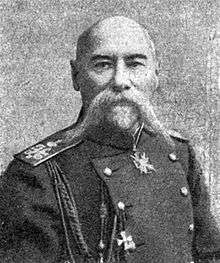Vladimir Danilov
Vladimir Nikolayevich Danilov (1852 - November 14, 1914) was a adjutant general, infantry general, and soldier in the Russo-Japanese War.
Vladimir Nikolayevich Danilov | |
|---|---|
 | |
| Born | 1852 |
| Died | November 14, 1914 (O.S. November 1) |
| Allegiance | Russian Empire |
| Service/ | Imperial Russian Army |
| Commands held | 2nd Guards Infantry Division (Russian Empire) 1st Guards Corps (Russian Empire) 23rd Army Corps (Russian Empire) |
| Battles/wars | Russo-Japanese War World War I |
Biography
He graduated from the Nikolaev real gymnasium (1870) and the Konstantinovsky military school. Produced as an officer in the Life Guards Jaeger Regiment in 1872, he volunteered in the Serbian–Turkish Wars (1876–1878) and the Russo-Turkish War (1877-1878).
Headquarters Captain (03/28/1882), Captain (04/24/1888), Colonel (03/28/1893). In 1898 he was given command of the 96th Omsk Infantry Regiment, and on March 26, 1903 he was promoted to major general with the appointment of general for assignments under the commander of the forces of the Amur Military District. With the outbreak of the Russo-Japanese War, a soldier from head to toe, Danilov proceeded to appoint himself to the army.
Having received a brigade in the 6th East Siberian Rifle Division, after Tyurenchen he was appointed its chief and commanded it with outstanding distinction. Near Liaoyang, on August 17, he personally directed the repulsion of violent attacks on a section of the position occupied by the 23rd and 24th East Siberian Rifle Regiments and was awarded the Order of St. George of the 4th degree. During the days of the fights on the Shah, he led the attack of the Cursed Hills (near the village of Kaotayzi), about which the bypass movement of the 3rd Siberian Corps crashed, and was wounded. During the days of the Battle of Mukden, from February 14 to 24, he kept at the village of Kudyaz twice the strongest enemy from breaking his line of our military location and was awarded the Order of St. George of the 3rd degree.
In addition, for military distinctions in this war, he received gold weapons and the rank of lieutenant general (02.14.1905), the Order of St. Anna of the 1st degree with swords and the rank of adjutant general (1906). Among the troops, he enjoyed great love and respect, which he earned sincere concern for the lower ranks, ardent defense of the interests of officers, his simplicity and good nature, his outstanding courage, and most importantly, his offensive tendencies, for which he was nicknamed the "general from the offensive."
In October 1905, Danilov was entrusted with the leadership of the evacuation of Russian prisoners from Japan, which he successfully completed by the spring of 1906. After a short command of the 2nd Guards Infantry Division (until the summer of 1906), he was appointed commander of the Guards Corps and commanded him until the beginning of 1912, when he was appointed a member of the Alexander Committee on the Wounded. General of Infantry (Art. 10.04.1911; for distinction). Danilov is on the lists of the 21st Siberian Rifle Her Imperial Majesty the State. Empress Alexandra Fedorovna regiment.[1]
Since January 1, 1913 - the commandant of the St. Petersburg fortress. With the outbreak of World War I, he was appointed to the army by the commander of the 23rd Army Corps, remaining in the life post of commandant of the Petersburg Fortress. For the battles of his corps on the Vistula and near Lovich, he was awarded the Order of St. Alexander Nevsky. He was buried at the Commandant Cemetery of the Peter and Paul Fortress in St. Petersburg.
Awards
Orders
- Order of St. Anna, 4th class (1877);
- St. Stanislav 1st Art. (1905);
- St. George 4th Art. (VP 01.11.1905);
- Golden weapons (VP 05.12.1905);
- Order of St. Anna, 1st Art. with swords (1906);
- St. George 3rd Art. (VP 19.09.1907);
- Order of St. Vladimir, 2nd art. (1909);
- White Eagle (1913);
- St. Alexander Nevsky with swords (10.25.1914).
| Preceded by |
Commander of the 2nd Guards Infantry Division 1905-1906 |
Succeeded by |
| Preceded by |
Commander of the 1st Guards Corps 1906-1912 |
Succeeded by |
| Preceded by |
Commander of the 23rd Army Corps August 30 - November 1914 |
Succeeded by |
References
- Масик С.Н. (2001). "О подробностях не сообщалось... Эвакуационная комиссия генерала Данилова" (26) (Гангут ed.): 84–93. Cite journal requires
|journal=(help)CS1 maint: date and year (link)